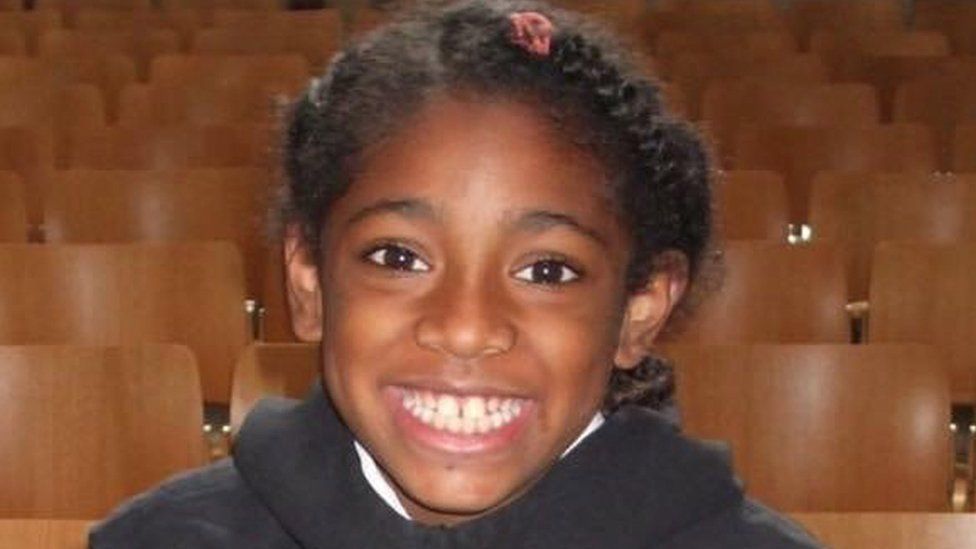Climate activism failing to represent BAME groups, say campaigners
- Published

The mother of Ella Kissi-Debrah - the nine-year-old girl whose fatal asthma attack may have been linked to illegal levels of pollution - has said there is a lack of representation in climate activism.
People living in parts of London with high proportions of black, mixed or other ethnic groups are disproportionately affected by air pollution compared to those in areas with a high proportion of white people, according to research by the Mayor of London.
Yet people from BAME (black, Asian and minority ethnic) backgrounds are often invisible in climate protest, says Rosamund Kissi-Debrah - who is due to speak at the World Health Organization on Monday.
The effects of air pollution on human health
Ms Kissi-Debrah, who lost her daughter in 2013, says black or ethnic minority people care about climate change as much as other groups.
"I focus on air pollution, obviously because of what happened to my daughter, but also because people where I live care about pollution.
"Pollution has a direct impact on their lives."
Echoing Ms Kissi-Debrah's comment is Professor Akwugo Emejulu - a sociology lecturer at the University of Warwick specialising in women of colour's activism in Europe.
She says the main reason for what she sees as their lack of representation in activism lies in some of the tactics used by action groups, such as Extinction Rebellion.
One of the strategies adopted by Extinction Rebellion during their 10-day demonstration in April was to get as many activists as possible arrested.
Prof Emejulu says some black campaigners are put off this approach because they fear violence and hostility from the police.
Samantha Moyo is the coordinator for Extinction Rebellion Together - a section within the group that provides training on diversity.
She says it took a lot of effort to overcome her fear of police when joining protest campaigns.
"I don't know what it is about being black that makes you feel scared around police," she said.
"I've always got a feeling of, 'they're going to get me - out of everyone here, they're going to come for me'."
Ms Moyo says she only felt safe from police at the latest protests because she was "holding hands with a fellow protester, who was white".
She says police could help to reduce the fear sometimes felt by people of colour if they behaved in a more approachable way.
"Something as simple as a smile. Or maybe something like a declaration from a police department, saying: 'We admit this has been a problem', that would be quite healing.
"Or even allowing or creating spaces for people who are traumatised by police to share their stories. A lot of people of colour are traumatised."
Kids of Colour - a platform for young ethnic minority people to explore identity and "challenge institutional racism" - says climate protests do not always allow for the realities they face.
School students around the world recently went on strike to demand action on climate change, but some at Kids of Colour question how inclusive the protests were.
"The school strikes have been fantastic to witness, but it is also a privilege to be able to skip school," says one representative.
"Many young people of colour feel a pressure to succeed in education because society does not work in their favour."
Greta Thunberg is the 16-year-old Swedish teen behind the school climate strikes
Economic inequality can be another barrier for people of ethnic and minority backgrounds who are affected by climate change, says Ms Kissi-Debrah.
"Can you imagine giving up 10 days [of work] to sit in central London? It is absolutely not feasible for those in low-paid jobs.
"I'm not saying everyone in Extinction Rebellion is in a privileged situation, but a lot of them were in jobs that make it easier for them to take time off work."
Climate activists in Cardiff Bay say "concrete action" is needed now - not in the future
The Wretched of the Earth, which describes itself as "a collective of grassroots indigenous, black, brown and diaspora groups", wrote an open letter to Extinction Rebellion asking the group to rethink its tactics.
While commending Extinction Rebellion's successes, the letter said ethnic and minority voices were missing from the movement and need to be included early on, in order to effectively challenge systems upholding "racism, sexism and classism".
Referencing Miss Thunberg's "house on fire" analogy, the group said: "Our communities have been on fire for a long time and these flames are fanned by our exclusion and silencing."
So how can pressure groups draw everyone in?
People from BAME backgrounds need to be taken into consideration from the very start, says Prof Emejulu.
"It's not about organising in your own terms and then trying to draw people in. You have to be embedded in the communities with the people that are affected by this.
"It's also about democracy - if democracy isn't reflected in your activism then that's a problem."
Ms Moyo says Extinction Rebellion is working on taking action to ensure that people of colour are not being left out.
"I'm excited about what we're doing," she says, "because we'll be raising awareness and providing training around racism, colonialism, systemic trauma and other important issues."
Other campaign groups are also addressing the matter.
Greens of Colour is part of the Green Party, aiming to represent BAME members. And Friends of the Earth (FoE) has also acknowledged there is a problem with diversity in climate debates.
In particular, says an FoE spokeswoman, groups need to be better at recruitment and "bringing people in that the sector hasn't done very much to interest".
FoE now gives potential supporters a variety of ways to join and tries to make sure they see their experiences reflected in campaigns.
The spokeswoman adds: "But we own that we have a long way to go."
- Published3 July 2018
- Published23 April 2019
- Published24 May 2018
- Published8 May 2018